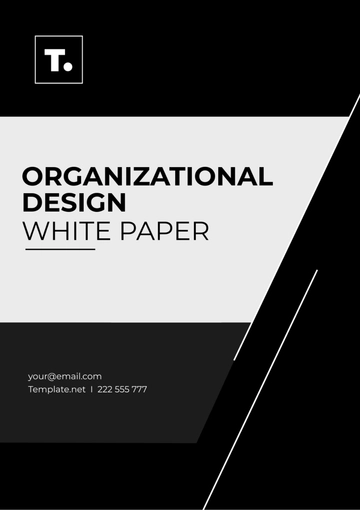Free Operation White Paper

Enhancing Customer Engagement in the Digital Age
Prepared by: [YOUR NAME]
Company: [YOUR COMPANY NAME]
Department: [YOUR DEPARTMENT]
Date: [DATE]

I. Executive Summary
In today's digital landscape, businesses are constantly seeking ways to enhance customer engagement to drive growth and loyalty. This white paper explores the strategies and technologies that companies can leverage to create meaningful interactions with their customers.
II. Introduction
A. Background
The digital revolution has transformed the way businesses interact with their customers. With the rise of social media, mobile devices, and e-commerce platforms, customers now expect personalized and seamless experiences across all touchpoints. This shift has forced businesses to rethink their approach to customer engagement.
B. Purpose
This white paper aims to provide insights into effective customer engagement strategies in the digital age. It will highlight best practices and innovative approaches to building strong customer relationships.
C. Scope
The white paper will cover a range of topics, including the use of data analytics, artificial intelligence, and omnichannel marketing to enhance customer engagement. It will also explore the role of customer feedback and loyalty programs in driving customer engagement.
III. Problem Statement
Many businesses struggle to engage customers effectively in the digital age, leading to reduced customer satisfaction and loyalty. According to a study by Salesforce, 64% of consumers expect companies to interact with them without delay, highlighting the importance of real-time engagement strategies.
IV. Research Methodology
A. Data Collection
Data for this white paper was collected through a combination of primary research, including surveys and interviews, and secondary research, including industry reports and case studies. The primary research involved a survey of 500 consumers to understand their preferences and expectations regarding customer engagement.
B. Data Analysis
The data was analyzed using statistical tools and qualitative analysis methods to identify key trends and insights. The analysis revealed that personalized communication, timely responses, and proactive engagement are critical factors in enhancing customer engagement.
Personalization: 78% of consumers are more likely to engage with a brand that offers personalized experiences.
Timeliness: 82% of consumers expect an immediate response to their inquiries or complaints.
Proactivity: 70% of consumers are more likely to be loyal to a brand that proactively communicates with them.
Chart 1: Customer Engagement Channels Preferences
V. Findings
The findings reveal that businesses that prioritize customer engagement see higher customer satisfaction rates and increased revenue. According to a study by Digital Commerce 360, companies with strong omnichannel customer engagement strategies retain an average of 89% of their customers, compared to just 33% for companies with weak strategies.
VI. Recommendations
Based on the findings, we recommend that businesses invest in advanced analytics tools to better understand customer behavior and preferences. Additionally, companies should focus on creating personalized and interactive experiences across all channels. Some key recommendations include:
Implementing AI-powered chatbots: Use chatbots to provide personalized recommendations and support to customers in real time.
Utilizing data analytics: Analyze customer data to gain insights into their preferences and behavior, allowing for more targeted and effective engagement strategies.
Leveraging social media: Use social media platforms to engage with customers, respond to inquiries, and gather feedback.
Creating loyalty programs: Implement loyalty programs to reward customers for their engagement and encourage repeat purchases.
VII. Case Studies
Case Study 1: [COMPANY A NAME]
[COMPANY A NAME] implemented an AI-powered chatbot on their website to provide personalized product recommendations to customers. As a result, they saw a 30% increase in online sales and a 20% increase in customer satisfaction.
Case Study 2: [COMPANY B NAME]
[COMPANY B NAME] launched a social media campaign to engage with customers and gather feedback on their products. This led to a 25% increase in social media engagement and a 15% increase in brand loyalty.
VIII. Conclusion
In conclusion, effective customer engagement is essential for businesses to thrive in the digital age. By implementing the strategies outlined in this white paper, companies can build stronger relationships with their customers and drive long-term success.
IX. References
Salesforce. (2020). State of the Connected Customer. Retrieved from https://www.salesforce.com/research/customer-expectations/
Digital Commerce 360. (2013, December 31). Why an omnichannel strategy matters. Retrieved from https://www.digitalcommerce360.com/2013/12/31/why-omnichannel-strategy-matters/
X. Appendices
Appendix A: Survey Questions
Appendix B: Detailed Data Analysis
Appendix C: Additional Case Studies
- 100% Customizable, free editor
- Access 1 Million+ Templates, photo’s & graphics
- Download or share as a template
- Click and replace photos, graphics, text, backgrounds
- Resize, crop, AI write & more
- Access advanced editor
Template.net’s customizable Operation White Paper Template is a valuable tool for businesses looking to document their operational strategies. Editable in our Ai Editor Tool, this template allows for easy customization to fit your specific needs. Whether you're outlining processes or detailing procedures, this template streamlines the creation of professional operation white papers.





























